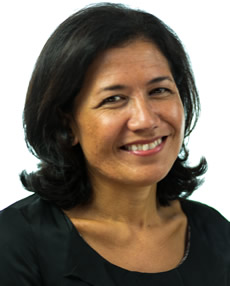MPM graduate successfully juggling professional and cultural skills
Clinician, policy practitioner, head of a consultancy focused on Pacific policy and health services, and now part-time PhD candidate – Debbie Ryan already has an impressive career. What help has her Master in Public Management degree been?

Clinician, policy practitioner, head of a consultancy focused on Pasifika policy and health services, and now part-time PhD candidate – Debbie Ryan already has an impressive career.
So what help has her Master in Public Management (MPM) degree been?
Early in her clinical career, Debbie participated in committee work on major policies such as the New Zealand Health Strategy.
Reflecting on moving from clinical practice to policy, Debbie notes: "You're never seen as just a clinician. Your profession expects you to represent your Pacific community's views, and your community expects likewise.
"Others expected me to have skills – professional and cultural – around consultation, to understand the problems facing Pasifika people, and to be effective on committees I was put onto."
As a Master's student, Debbie notes, "It was really important just to be there, especially given the low proportion of Pacific people who do such courses. But I also knew it was an opportunity to articulate a minority worldview, including the views of some our most vulnerable communities.
"Having worked in busy clinical and policy roles, my Master's study enabled me to step back and take time to seriously reflect and engage with senior academics and others who've thought deeply about these issues, and who bring multi-disciplinary perspectives to bear.
"It was also great hearing non-Pacific people raise similar issues to those raised by Pacific people, and hearing from people who understood the perspectives of government ministers and other decision makers."
Insights into helping minority populations
Debbie has also gained insights into helping minority populations.
"It's deeply important to engage with minority populations and bring forward minority workforces if we are to develop a truly multicultural society. But more attention needs to be given to the level of support and access people have to training, to ensure the opportunities and inputs of minorities are as effective as possible.
"Finding those who are willing and able to nurture and protect a unique worldview is vital if we are to bring forward Pacific people.
"This is especially so when serious engagement with a majority view is needed. I’m delighted to say I found that level of support within the School of Government."
MPM study gave Debbie an excellent 'toolkit', especially "for a clinician who had done a lot of policy work without much exposure to formal study in the field".
Juggling the policy process
Debbie also better understands policy-process 'levers', and what other participants bring to the policy table.
"I once thought the policy process was straightforward; now I know each participant is like a juggler with multiple balls in the air.
"Recognising what others are juggling, and communicating with them in a language you all understand, increases the chance that your perspective is recognised and taken on board. Having practical and theoretical knowledge gives you 'space' in the policy process within which to operate."
Friend and colleague Rachel Enosa-Saseve, Manager of Service Development & Integration at Alliance Health + Primary Health Organisation, echoes this.
"Debbie’s ability to link her knowledge of policy tools and the machinery of government with what's happening at the coal face is really important.
"Knowing what levers to pull creates a better interface between policy and practice; consequently, Pacific health providers are able to better show how their actions benefit patients and government departments alike."
Professor Jackie Cumming, Debbie's PhD supervisor, adds, "Debbie's work as a clinician, policy maker and advocate is well known, but her recent studies have enabled her to engage deeply with public policy processes and decisions that influence outcomes for Pasifika communities, and to think strategically about how to improve those outcomes.
